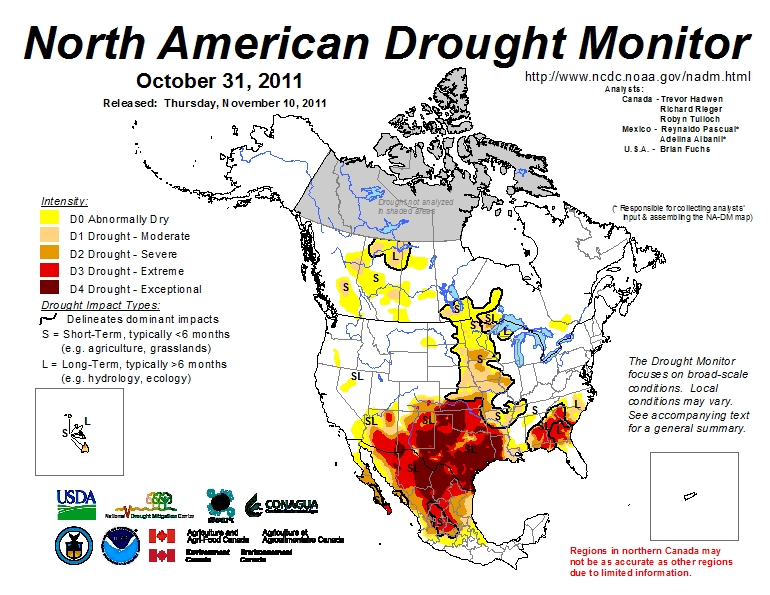8 December 2011
Breaking the hydro-illogical cycle
Posted by kramsayer

Systems like the North American Drought Monitor can provide the foundation for proactive drought policies. (Credit: NOAA)
The news about drought is that – compared to other natural hazards like earthquakes and hurricanes – it doesn’t make the news that often.
Droughts are the “Rodney Dangerfield of natural hazards,” said Don Wilhite of the University of Nebraska. “They get no respect.”
Drought doesn’t wake you in the middle of the night by shaking the walls and breaking china, it doesn’t spew molten rock or flood the neighboring town. It’s a creeping, frog-in-hot-water kind of disaster with an ill-defined beginning and end.
Droughts are, however, receiving attention at the American Geophysical Union’s Fall Meeting. Wilhite gave a talk Tuesday during a session that focused on developing drought early warning systems. These could break what Wilhite calls “the hydro-illogical cycle.”
The hydro-illogical cycle happens as public awareness grows in response to a drought, then progresses to panic, he said. Once water starts falling from the skies again, apathy settles in and people forget about it until the next drought.
Disaster responses that come out of the hydro-illogical cycle are reactive, but early warning systems like the U.S. Drought Monitor, North American Drought Monitor and the Global Drought Early Warning System, are helping policy-makers anticipate and prepare for dry spells. Drought is second only to hurricanes for economic losses in the U.S.
Compared to climatology, Wilhite said, social vulnerabilities from drought are poorly understood.
For example, U.S residents are moving away from the Northeast and Midwest and toward the West, Southwest and Southeast—the angry red spots on the U.S. drought monitor maps where “the bullseyes of drought are.”
“How are we going to support the population base?” Wilhite asked. It’s promising, however, that policy-makers are starting to use drought early warning systems, he said. It appears that science is helping drought get some respect.
– Sarah Jane Keller is a science communication graduate student at UC Santa Cruz


 GeoSpace is a blog on Earth and space science, managed by AGU’s Public Information staff. The blog features posts by AGU writers and guest contributors on all sorts of relevant science topics, but with a focus on new research and geo and space sciences-related stories that are currently in the news.
GeoSpace is a blog on Earth and space science, managed by AGU’s Public Information staff. The blog features posts by AGU writers and guest contributors on all sorts of relevant science topics, but with a focus on new research and geo and space sciences-related stories that are currently in the news.
Mexico has lost more then a million cattle. This is their worst recorded drought.